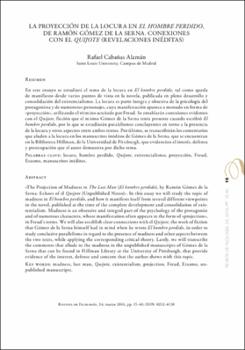La proyección de la locura en El hombre perdido, de Ramón Gómez de la Serna. Conexiones con el Quijote (revelaciones inéditas)
Author
Cabañas Alamán, RafaelDate
2016Abstract
En este ensayo se estudiará el tema de la locura en El hombre perdido, tal como queda de manifiesto desde varios puntos de vista en la novela, publicada en pleno desarrollo y consolidación del existencialismo. La locura es parte íntegra y obsesiva de la psicología del protagonista y de numerosos personajes, cuya manifestación aparece a menudo en forma de «proyección», utilizando el término acuñado por Freud. Se entablarán conexiones evidentes con el Quijote, ficción que el mismo Gómez de la Serna tenía presente cuando escribió El hombre perdido, por lo que se estudiarán paralelismos concluyentes en torno a la presencia de la locura y otros aspectos entre ambos textos. Por último, se transcribirán los comentarios que aluden a la locura en los manuscritos inéditos de Gómez de la Serna, que se encuentran en la Biblioteca Hillman, de la Universidad de Pittsburgh, que evidencian el interés, defensa y preocupación que el autor demuestra por dicho tema. In this essay we will study the topic of madness in El hombre perdido, and how it manifests itself from several different viewpoints in the novel, published at the time of the complete development and consolidation of existentialism.
Madness is an obsessive and integral part of the psychology of the protagonist and of numerous characters, whose manifestation often appears in the form of «projection», in Freud’s terms. We will also establish clear connections with el Quijote, the work of fiction that Gómez de la Serna himself had in mind when he wrote El hombre perdido, in order to study conclusive parallelisms in regard to the presence of madness and other aspects between the two texts, while applying the corresponding critical theory. Lastly, we will transcribe the comments that allude to the madness in the unpublished manuscripts of Gómez de la Serna that can be found in Hillman Library at the University of Pittsburgh, that provide evidence of the interest, defense and concern that the author shows with this topic.





